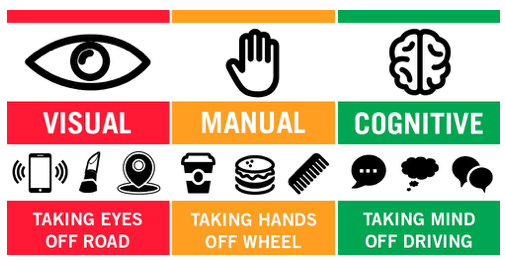
Distracted More than Usual?
Distracted driving is an issue for all commercial fleets and something everyone should be concerned about. One of the three types of distractions is cognitive distraction – when your mind wanders away from the task of driving. Unlike manual and visual distractions, where you are physically distracted from driving, you may not even realise you’re cognitively distracted – until it’s too late.

With coronavirus and COVID-19 on everyone’s mind, we’re distracted even more. We’re worried about our jobs, worried about our families and worried about what will happen tomorrow. It’s difficult to stay focused on today, let alone on what’s on the road in front of you. Take a moment and think about what causes cognitive distractions:
- A heated or passionate discussion or argument with a co-worker, family member or passenger
- A phone call on a hands-free cell phone device, such as Bluetooth
- A passionate reaction to news on the radio
- Listening to an audio book
- Daydreaming
- Multi-tasking
- Thinking about things other than driving, such as upcoming activities, work issues, responsibilities, etc.
- Any emotion that distracts you, including anxiety, stress, fear, frustration, sadness, confusion, etc.
What happens when a driver is cognitively distracted?
- Has slower reaction times. In fact, one study found that legally drunk drivers had faster response times than cognitively distracted drivers.
- Is blind to their surroundings. Researchers found that nearly half of the information in a cognitively distracted driver’s immediate environment—traffic signs and signals, other vehicles, etc.—went unnoticed.
- Has reduced activity in parts of the brain that are usually active while driving. For example, parts of the brain that are dedicated to processing visual information, spatial information, and overseeing navigation show less activity when a driver is engaged in conversation, listening to news or talk shows, or listening to audio books.
Unfortunately, the negative effects of cognitive distraction also last longer than drivers realise. In fact, drivers remain cognitively distracted for 15 to 27 seconds after they have stopped using their hands-free devices, according to a study cited by The Washington Post. That’s a frightening amount of time when you consider that a car going just 25 miles per hour can travel 1,080 feet in 27 seconds. Anyone in that driver’s way is in real danger.
Talk to your drivers and make them aware of cognitive distractions. Encourage them to silence their cell phones and put them away. Listen to calming music or talk – but nothing they’ll have a strong reaction to. Remind any passengers that they’re driving first and foremost. And last, but certainly not least … breathe deeply and remind themselves that they’re in control of a large, lethal machine; it’s their responsibility to keep others safe.
- Posted by Eduardo Valencia
- On May 6, 2020

